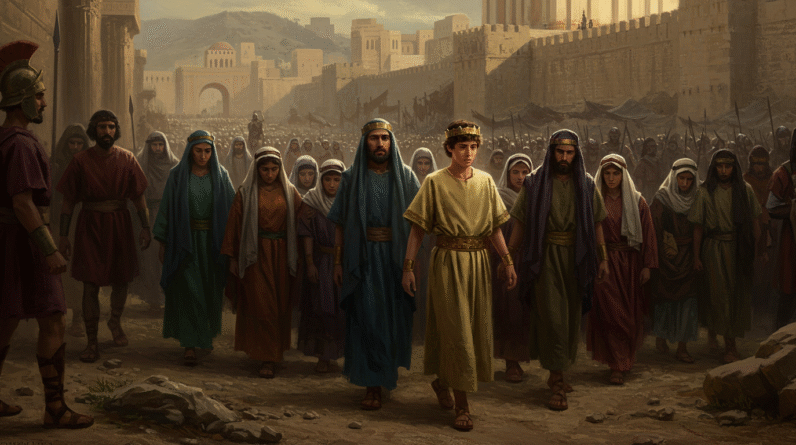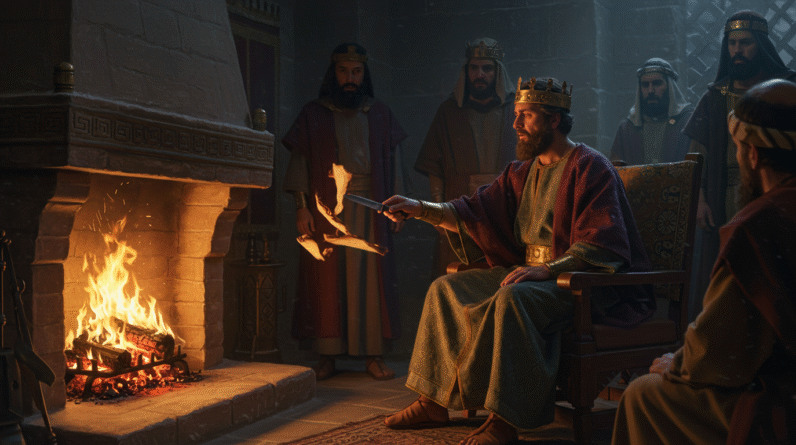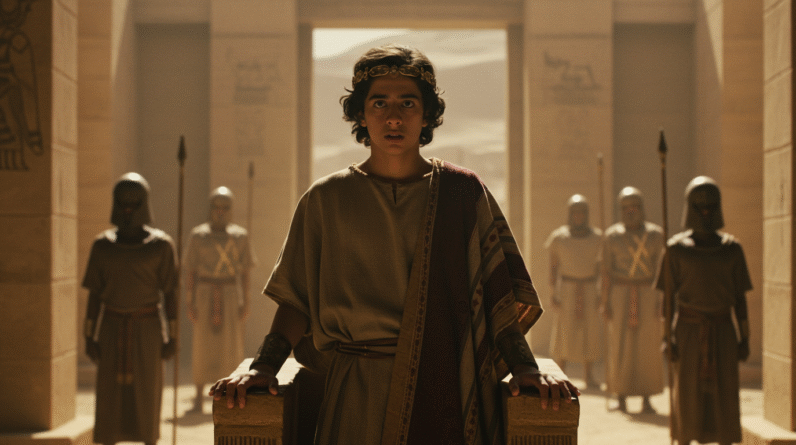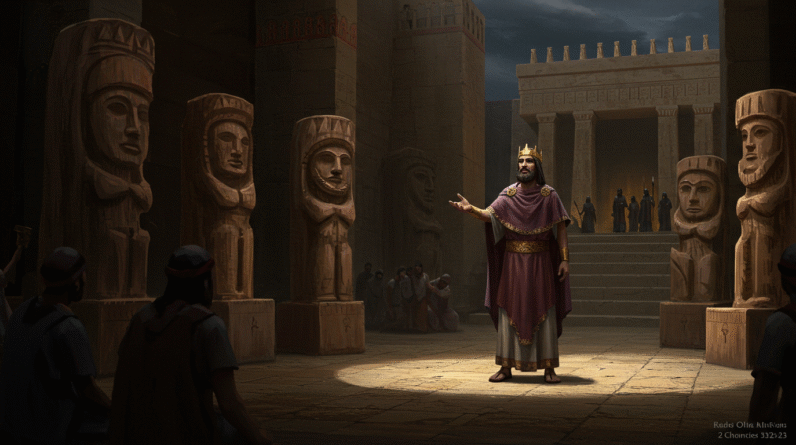Ahaz: The King Who Trusted Assyria Instead Of God (2 Kings 16:7–8)
You know the particular, ordinary panic that happens when something you thought steady turns out to be fragile — the electricity that flickers, the train that’s late, the diagnosis you didn’t expect. Ahaz feels like that moment stretched into a lifetime. He’s a king whose choices read to you like an anxious attempt to shore up security, to buy certainty in the marketplace of powers. The Bible records his decision with a kind of ruthless economy. You hear the facts, and you feel the moral weight without any sermonizing voice to soften it: he turned to Assyria, offering silver and gold, and Assyria helped. 2 Kings 16:7–8.
When you look at Ahaz, you find a person — not an abstraction. You can imagine him leaning over a table, looking at maps, listening to advisers, counting coins. You can imagine his chest tightening each time someone says, “If only we had a stronger ally.” What you have to keep in mind as you read the story is how domestic, how human the temptation is: to prefer a visible, immediate power over an unseen promise. That pattern is what the narrative wants you to watch.
Who was Ahaz? The man and his moment
You could reduce Ahaz to dates and lineages, and the Bible gives those to you as plain facts: he became king of Judah when he was twenty, and he reigned for sixteen years in Jerusalem. That’s in 2 Kings 16:1. But the biography the text offers is not just a chronology. It’s also a moral ledger. The chronicler and the writer of Kings both note his failure. They say he “did not do what was right in the eyes of the Lord,” and that he followed the abominable practices of the surrounding nations — including child sacrifice and pagan worship — and he even went so far as to make shrines on the hills and under every green tree. See 2 Kings 16:2–4 for the bluntness of this assessment.
You don’t need to be told that political failure is often mixed with personal spiritual failure in these narratives. It reads like a domestic tragedy: insecurity produces a search for power, which produces compromise, which produces more insecurity. When you read about Ahaz, you see someone who had inherited a dangerous position. His father, Jotham, had been a decent king in a way; Ahaz inherited alliances and enmities from a time when the northern kingdom of Israel and Aram (Syria) had different ambitions. Ahaz’s choices will make you uneasy because they’re recognizably human.
The geopolitical squeeze: Israel, Aram, and Assyria
You don’t have to be an expert in ancient Near Eastern politics to see how precarious Ahaz’s situation was. To the north, the kingdoms of Israel and Aram had allied. They wanted to replace him with a friendly ruler in Jerusalem, someone who’d join their coalition against Assyria. That geopolitical pressure is where the story begins in earnest; the crisis is real and immediate. The prophet Isaiah is involved in this scene, speaking directly to Ahaz about what to do. See Isaiah 7:1–9 for the background and the prophetic counsel offered.
What you notice in the narrative is this: pressure from the north creates a temptation to seek protection from the east. Assyria was emerging as a ruthless superpower. If you were a king like Ahaz, you would know that aligning yourself with Assyria could mean safety, wealth, and the crushing of your immediate enemies. It would also mean humiliating dependence. The story presents that trade-off as the moral hinge on which Ahaz’s life swings.
The decision: sending tribute to Tiglath-Pileser (2 Kings 16:7–8)
You get to the crucial lines and they’re spare as any good story should be. The record tells you that Ahaz sent messengers to Tiglath-Pileser king of Assyria, along with silver and gold from the house of the Lord and from the king’s own treasures, and Ahaz humiliated himself before the king of Assyria. The king of Assyria responded by attacking Damascus and taking people captive. Read the account in 2 Kings 16:7–8, and you see the transactional nature of the exchange: money, submission, military intervention.
You can imagine the scene like a negotiation in a smoky room. But the detail that grabs you is the sacrificial economics: Ahaz used the temple’s treasures. You know what that means. The temple, for Israel and Judah, is not just architecture or wealth; it’s the sign of God’s presence among his people. When you convert that presence into coin to secure foreign protection, you’ve moved beyond simple pragmatism. You’ve made a spiritual wrong into a political solution. The text leaves the moral judgment to the facts: after this, Judah is less free, its worship is compromised, and Ahaz’s lineage moves toward deeper trouble.
When the foreign ally becomes the master: immediate consequences
The military story seems to go the way Ahaz wanted, briefly. Tiglath-Pileser indeed attacked, and he carried captives away, which the record frames as an immediate success for Ahaz. See 2 Chronicles 28:20–21 for another perspective on the same events. But you feel the cost exactly because the price was offensive to the covenant relationship: it was built on the plundering of God’s house and on accepting subjection to a foreign, idolatrous power. That sequence — short-term relief followed by compromised identity — is what the biblical writers want you to notice.
You might expect that the Bible would give Ahaz a clean victory and leave it at that. Instead, the narrative lets the consequences accumulate. He brings foreign court practices and objects into Jerusalem. He builds altars of his own design. He dismantles familiar worship patterns. The reader is left with the image of a temple where the forms of worship are reshaped into mimicry of foreign rites. Read 2 Kings 16:10–18 and you’ll see how Ahaz altered the worship apparatus to resemble what he saw in Damascus and, implicitly, in the Assyrian worship system he admired or served.

Religious consequences: the house reshaped to foreign designs
You have to notice the specificity: Ahaz doesn’t just stop being pious. He actively remodels worship. The furnace of God’s house — the rituals, the altars, the daily prayers — gets adjusted to align with what he perceives as the politics that matters. In 2 Kings 16:10–11, the king of Assyria shows Ahaz a model of an altar, and Ahaz copies it. The altar shapes the liturgy. That might sound technical, but the point is substantive: when you change the structure of worship, you change the theology that worship communicates.
You realize, then, that the story is not only about geopolitical dependence; it’s about epistemology — about how you come to know God or fail to know God through the forms and patterns of worship. When Ahaz imports an Assyrian model, he is importing a theology of empire. The altar’s shape teaches people to look toward foreign power for salvation. You can see how the story’s authors are concerned: religion becomes a handmaiden to realpolitik. The damage goes beyond policy; it touches identity and memory.
Isaiah and the sign you refused
There’s a prophetic counterpoint to Ahaz’s politics. The prophet Isaiah meets the king in his crisis and issues a strange invitation: trust God. The prophet’s speech is calm, unyielding, and slightly incredulous. He tells Ahaz to ask for a sign from the Lord, to test God’s faithfulness. Ahaz refuses, saying he will not test the Lord. Read the exchange in Isaiah 7:12 and the surrounding context Isaiah 7:1–9. You’ll notice the moral logic: God offers a sign that would require no alliance with the empire; Ahaz, by refusing that sign, chooses his own calculative approach.
You can feel the tragic irony. The sign Isaiah offers is a guarantee of God’s presence — the Immanuel prophecy later becomes a theological hinge in Christian readings — and yet Ahaz refuses it because he wants to appear pious, or perhaps because he fears trusting what he can’t see. The refusal reads like a moral failure you understand intimately: a refusal to risk trust in favor of apparent control. In your everyday life, that refusal might be subtler: you choose the mortgage you can manage rather than the faith practice that unsettles you; you choose the ally who promises security rather than the hard fidelity that costs something.
Assyria as an instrument and a judgment (Isaiah’s broader voice)
Isaiah’s language is not merely countercultural; it’s predictive. He tells the people that Assyria will be used like a rod of punishment. In Isaiah 8, for example, the prophet speaks of the Assyrian advance as like a flood that will sweep on into Judah — a tool in God’s hands, paradoxically used as an instrument of judgment. See Isaiah 8:7–8. The uncomfortable theology here is that geopolitical actors can be both agents with their own agendas and instruments of divine purpose.
You can feel the dissonance. You might think of that as policy realism: sometimes you use an enemy to your advantage. But in the theological frame the Bible offers, that realism has costs — spiritual, communal, and moral. When you accept foreign power, you also accept its values. When you take its altar, you adopt its gods by proxy. The prophets want you to see that there’s no purely neutral political option: every alliance shapes who you are.
The longer story: how the choice shapes a kingdom
Ahaz’s decisions do not happen in isolation. You notice how the biblical narrative tracks patterns. Kings who substitute earthly for divine protection often precipitate decline. After Ahaz, the line continues toward greater disintegration. The immediate effect is more military security; the lasting effect is compromised worship, loss of independence, and cultural assimilation. That pattern is visible across the chronicled kings: short-term relief, long-term decline.
You can see this in the chronicler’s detail: Ahaz’s reign is marked by the introduction of foreign worship, the dismantling of temple customs, and the appropriation of temple wealth. See 2 Chronicles 28:22–25 for the chronicler’s assessment of his apostasy and its consequences. The text suggests that when a ruler makes expedience a virtue, the people follow. You begin to see how a king’s compromises become the people’s compromises. This is how cultures tilt.
Why the story matters for you
You might object that Ahaz is an ancient king and you’re not, so this story is irrelevant. But the narrative is less about chronology than about the human condition. You will recognize in Ahaz the impulse to make bargains that preserve comfort at the cost of conscience. You will also recognize how small, practical decisions — where you bank your savings, who you appoint, what rituals you adopt — can shift your moral imagination.
When you consider your own life, Ahaz’s choice reads as a warning: when you outsource your security to systems, institutions, or people, you may get the immediate protection you want, but you risk changing the shape of your inner life. The temple’s money that Ahaz hands over is a metaphor for that which you sanctify. What do you consider sacred? What would you be willing to sell for political or financial safety? The story asks you to notice what you are prepared to exchange.
How trust and fear play out in your choices
If you’re honest, you know fear is a powerful actor in your decisions. Ahaz’s fear of the northern coalition pushed him to seek powerful friends. That makes his decision forgivable in one sense; it’s understandable. But the narrative is also asking you to sit with the costs of fear. Fear narrows your perception and makes immediate relief look like salvation. Trust, by contrast, is risky: it asks you to accept uncertainty, to decline immediate fetters in favor of commitments that may not pay off in measurable ways.
You can imagine how trust would have looked for Ahaz: refusal to hand over the temple’s treasures, reliance on prophetic counsel, willingness to endure temporary hardship to maintain spiritual integrity. That’s not easy for you either. Trust often asks you to sacrifice comfort for fidelity. The story teaches you that fidelity to God and fidelity to the long-term moral health of the community may require you to resist short-term fixes.
The subtlety of idolatry: what it looks like when it is normalized
One of the story’s most unsettling aspects is how ordinary Ahaz’s idolatry becomes. It’s not only the dramatic gestures — copying an altar, bringing foreign images — but the normalization: altering the time of prayer, reshaping the daily rituals, appointing foreign priests. See 2 Kings 16:10–18 again for the specifics. When idolatry becomes procedural, you stop recognizing it as idolatry.
That normalization is instructive for you. Modern idolatry is often practical and soft: the idol of productivity, the idol of reputation, the idol of wealth. These gods are honored subtly. They ask for sacrifices that look like gone evenings, compromised ethics, a life that loses its center. When the state or the market asks for your loyalty, you have to notice what you are offering. Ahaz’s story pushes you to ask: where do you place your ultimate trust? And how does that location shape your practices and your worship?
The danger of imitating the wrong model
Ahaz is curious in a small but telling way: he sees an altar he admires and copies it. That desire to imitate the powerful is not limited to kings. You, too, often mimic what seems successful. You adopt the posture, the language, the tools of those you think are in control. But mimicry carries the risk of uncritically importing values. If the model is built on oppression, then imitation reproduces the oppression, even in a distant land or in a different form.
The text’s concern, therefore, is more than religious purity. It’s anthropological: what you imitate shapes you. If you model yourself after coercive powers, you will internalize coercion. That’s a lesson you can apply to institutions, businesses, friendships, and even devotional practices. Ask why you copy certain patterns and what their underlying logic is.
What would repentance have looked like?
You might wonder if there was any way back for Ahaz. The story suggests yes — because the prophets keep speaking, because God’s covenantal patience is long — but the historical trajectory shows that repentance is hard when instruments of power become too comfortable. Repentance might have meant refusing the Assyrian alliance, restoring temple practice, returning the plunder, and trusting the prophetic word. It might have meant short-term suffering and the risk of a different kind of loss: the loss of immediate safety for the sake of communal fidelity.
You can see in other kings’ stories that such reversals do happen. Hezekiah, for instance, later reforms. The biblical writers present these possibilities to you as moral choices, not deterministic fates. You are continually offered the chance to reorient. The narrative’s persistence in recording failures and reforms suggests a substantive hope: that repentance can reconstitute a people, even if the consequences for earthly security are painful.
An honest, practical application for you
The story of Ahaz isn’t a simple didactic tool. It’s not a formula where you extract a one-liner and move on. But there are practical applications you can carry into your ordinary days. Start by noticing what you’ve sanctified. Ask what you would be willing to give up rather than surrender the core of your faith or your conscience. That’s a hard question because it forces you to enumerate where your loyalties lie.
You might test your loyalties by small acts: don’t participate in a gossip campaign; refuse a shortcut that asks you to compromise your ethics; hold to a practice of prayer or generosity that does not produce immediate results. These are modest, not heroic. Yet Ahaz’s story shows how small compromises accumulate into institutional and communal rot. Prevention, in this sense, is industrial; it’s about the slow shaping of habits that either bind you to visible powers or keep you aligned with a deeper, covenantal truth.
What you should watch for in leaders and institutions
Ahaz’s narrative also trains you to be discerning about leadership. Leaders who always prioritize immediate security over covenantal fidelity may well be making the wrong bargain. Watch when leaders privatize public trust — when they sell resources or symbolic gestures that belong to the common good for the sake of alliances. That pattern is a red flag. The biblical writers saw the house of God as communal, not merely royal; violating that boundary was a political and spiritual crime.
So when you evaluate leaders, you might ask: Do they use the commonwealth for private advantage? Do they sacrifice communal rituals, rights, or symbols to gain favor with more powerful actors? Do they model a theology of dependence rather than independence grounded in justice and faithfulness? These are hard, political questions, but the story of Ahaz pushes you to hold them together: theology and politics, worship and policy.

Final reflections: a small mercy in a long story
You end Ahaz’s story with mixed feelings. There’s sorrow for the lost integrity and gratitude for the narrative’s honesty. The Bible doesn’t pretend Ahaz’s fear was illegitimate; it simply shows you what fear looks like when it becomes the chief reason for action. The story’s art lies in that clarity: no sermon, just a record of events that allows the moral and spiritual contours to appear on their own.
What you carry away might be a new attention to the small compromises you make and to the models you choose. You might also be reminded that prophetic voices — those who say “trust God” rather than “trust power” — are often the ones offering the long-term health of a community, even if their counsel appears risky in the moment. Isaiah’s presence in this story functions as that corrective voice. You learn to notice when you are tempted to accept easy solutions that cost your soul.
If you find this uncomfortable, that’s good. You want some discomfort if you’re going to grow. Ahaz’s life is an invitation to re-examine the economies you live by and the altars you copy, and to choose, slowly and with risk, a different loyalty.
Explore More
For further reading and encouragement, check out these posts:
👉 7 Bible Verses About Faith in Hard Times
👉 Job’s Faith: What We Can Learn From His Trials
👉 How To Trust God When Everything Falls Apart
👉 Why God Allows Suffering – A Biblical Perspective
👉 Faith Over Fear: How To Stand Strong In Uncertain Seasons
👉 How To Encourage Someone Struggling With Their Faith
👉 5 Prayers for Strength When You’re Feeling Weak

📘 Jesus and the Woman Caught in Adultery – Grace and Mercy Over Judgement
A powerful retelling of John 8:1-11. This book brings to life the depth of forgiveness, mercy, and God’s unwavering love.
👉 Check it now on Amazon
As a ClickBank Affiliate, I earn from qualifying purchases.
Acknowledgment: All Bible verses referenced in this article were accessed via Bible Gateway (or Bible Hub).
“Want to explore more? Check out our latest post on Why Jesus? and discover the life-changing truth of the Gospel!”








